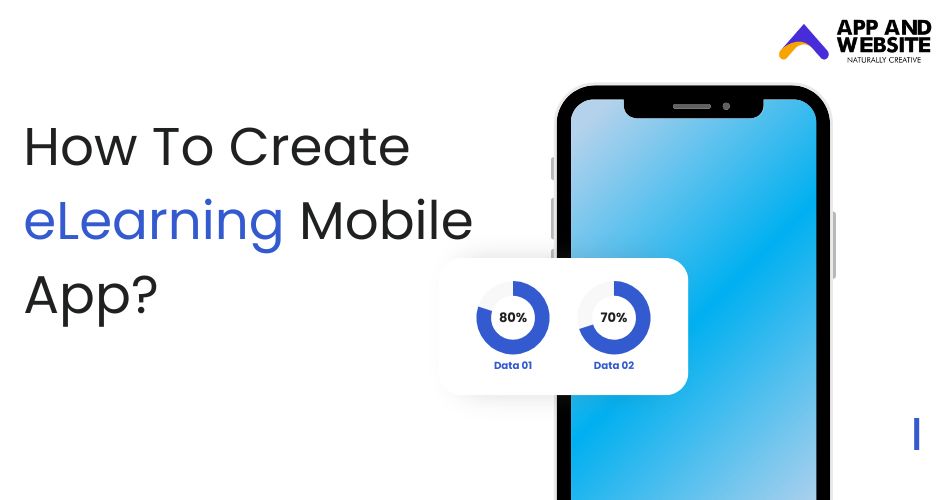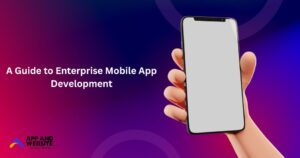Have you ever wondered how learning can fit right into your pocket? Imagine having access to a world of knowledge, anytime, anywhere, through just a tap on your phone. That’s the magic of eLearning mobile apps! In this blog we’ll walk you through the exciting journey of eLearning mobile app development. But first, let’s understand what exactly an eLearning mobile app is.
An eLearning mobile app is like having a personal tutor in your pocket, offering a wide range of courses and learning materials right at your fingertips. Whether you’re a student aiming to ace your exams, a professional looking to upskill, or a business owner seeking to train your workforce, eLearning apps have something for everyone. In this guide you will be learning about eLearning mobile app development, exploring its benefits, must-have features, advanced functionalities, development costs, and much more. Let’s begin!
What is an eLearning Mobile App Development?
eLearning mobile app development is like building a virtual school inside your smartphone. It’s the process of creating mobile applications specifically designed for learning and education. These apps offer a variety of courses, lessons, and study materials that users can access anytime, anywhere using their mobile devices.
You can think of it as having a digital library in your pocket, where you can learn new skills, revise on subjects, or prepare for exams on the fly. Developers use special tools and technologies to design these apps, making them easy to navigate and engaging for users of all ages.
From interactive quizzes to video lectures, eLearning mobile apps revolutionize the way we learn by making education more accessible and convenient. Whether you’re a student, a professional, or someone who loves to learn, eLearning mobile could be a game changer for you.
Why to invest in eLearning Mobile App Development?
Ever thought about why eLearning mobile apps are becoming so popular? Well, there are plenty of good reasons to invest in them!
Firstly, eLearning apps make learning super convenient. You can study whenever and wherever you want, whether you’re on the bus, at home, or waiting in line. Secondly, they offer a wide range of subjects and courses, catering to diverse interests and learning styles. Whether you want to learn a new language, master coding, or improve your cooking skills, there’s an app for that! Thirdly, eLearning apps are often interactive and engaging, using quizzes, games, and videos to make learning fun and effective. Moreover, they can be cost-effective, saving you money on traditional classroom courses and textbooks. Lastly, investing in eLearning apps can open up new opportunities for growth and advancement, both personally and professionally.
Key Statistics & Facts Of E-learning and Digital Education
- It is anticipated that the online learning platforms industry would generate US$3.26 billion in revenue by 2024.
- With revenue predicted to expand at a 7.86% annual rate (CAGR 2024–2029), the market is likely to reach a projected value of US$4.76 billion by 2029.
- By 2029, there are projected to be 63.6 million users in the online learning platforms industry.
- By 2029, user penetration is expected to reach 18.1%, up from 13.0% in 2024.
- It is expected that the average revenue per user (ARPU) will be $73.27.27 USD.
Types of eLearning Apps You Can Build
When it comes to eLearning apps, there’s a wide variety to choose from. Each type serves a different purpose and caters to different learning needs. Let’s explore the different types of eLearning apps you can build and how they can benefit you.
1. Learning Management System (LMS) Mobile Apps
Learning Management System (LMS) mobile apps are like digital classrooms in your pocket. They offer a comprehensive platform for educational institutions, businesses, and organizations to manage and deliver online courses and training programs. With an LMS app, students can access course materials, submit assignments, participate in discussions, and communicate with instructors—all from their mobile devices. For educators and administrators, LMS apps provide powerful tools for creating and organizing course content, tracking student progress, and assessing learning outcomes. These apps promote collaboration and engagement among learners, fostering a dynamic and interactive learning environment.
“Analysts at Fortune BU predict that the global learning management system (LMS) market will grow at a CAGR of 19.1% and reach $29 billion by 2026.”
2. Skill-based Learning Mobile Apps
Skill-based learning mobile apps are tailored to help users acquire specific skills or expertise in a particular area. These apps offer structured lessons, tutorials, and exercises designed to develop proficiency in a range of disciplines, from programming and graphic design to photography and language learning. Users can progress at their own pace, with many apps offering personalized learning paths based on individual strengths and weaknesses. Skill-based learning apps often incorporate interactive elements such as quizzes, challenges, and projects to reinforce learning and encourage hands-on practice. Whether you’re a beginner looking to build foundational skills or an experienced professional seeking to enhance your expertise, these apps provide accessible and effective means of skill development. With their user-friendly interfaces and engaging content, skill-based learning apps make it easy and enjoyable to acquire new knowledge and abilities on the go.
3. Subject-specific Learning Mobile Apps
Subject-specific learning mobile apps delve deep into a particular topic or subject area, offering comprehensive resources and materials for in-depth study. Whether you’re passionate about history, science, literature, or any other field of interest, these apps provide a wealth of information and educational content tailored to your chosen subject. Users can explore topics through interactive lessons, multimedia presentations, and curated collections of articles, videos, and images. Subject-specific learning apps often feature expertly curated content from reputable sources, ensuring accuracy and relevance. With intuitive navigation and user-friendly interfaces, these apps make it easy to dive into complex subjects and expand your knowledge base wherever you are.
4. Test Preparation Mobile Apps
Test preparation mobile apps are invaluable tools for students preparing for standardized exams and assessments. These apps offer a variety of resources and features designed to help users study effectively and perform their best on test day. From practice questions and flashcards to full-length practice tests and study guides, test prep apps provide comprehensive coverage of exam content and format. Users can track their progress, identify areas of strength and weakness, and focus their study efforts where they’re needed most. Many test prep apps also offer personalized recommendations and adaptive learning algorithms to tailor study plans to individual needs and learning styles. With convenient access to study materials anytime, anywhere, users can maximize their study time and build confidence leading up to the exam.
5) Corporate Training Apps
Corporate training apps are specifically designed to meet the learning and development needs of employees within organizations. These apps offer a convenient and flexible way for companies to deliver training materials, courses, and resources to their workforce, regardless of location or time constraints. Corporate training apps cover a wide range of topics, including compliance training, soft skills development, product knowledge, and industry-specific certifications. They often include interactive modules, videos, quizzes, and assessments to engage learners and reinforce key concepts. With features like progress tracking, performance analytics, and certification tracking, corporate training apps enable employers to monitor employee learning outcomes and track the effectiveness of their training programs.
What Are The Benefits of eLearning Mobile App Development
eLearning mobile app development offers plenty of benefits for both students and business owners. Let’s explore the advantages of eLearning apps in detail and understand how they can positively impact learning and training experiences.
Benefits for Students:
1. Accessibility and Flexibility
eLearning apps provide students with the flexibility to learn at their own pace and convenience. They can access educational content anytime, anywhere, making learning more accessible than ever before.
2. Interactive Learning Experience
These apps offer interactive features such as quizzes, games, and simulations, making learning engaging and enjoyable for students of all ages.
3. Personalized Learning
eLearning apps can adapt to individual learning styles and preferences, offering personalized recommendations and content to cater to each student’s needs.
4. Cost-Effective
Compared to traditional classroom-based learning, eLearning apps often offer cost savings on tuition fees, travel expenses, and study materials, making education more affordable and accessible to a wider audience.
5. Access to Diverse Content
With eLearning apps, students have access to a vast library of educational resources, ranging from textbooks and lectures to videos and interactive tutorials, covering a wide range of subjects and topics.
Benefits for Business Owners:
Businesses today are discovering the many advantages of using eLearning mobile apps for training their employees. These apps offer lots of benefits, like being able to grow and reach employees all around the world. They also help save money and allow bosses to track how well their employees are doing in real-time. Plus, with eLearning apps, businesses can ensure that all their employees receive top-notch training, no matter where they are. Let’s take a closer look at these benefits and see how they can make a big difference for businesses everywhere
1. Scalability
eLearning apps offer businesses the ability to scale their training programs easily to accommodate a growing workforce or changing organizational needs. Whether onboarding new employees or rolling out new training initiatives, eLearning platforms can expand or contract as needed without significant infrastructure investments.
2. Global Reach
With eLearning apps, businesses can reach employees located in different geographic locations or remote work environments. This global reach enables consistent training delivery across diverse teams, ensuring all employees receive the same level of education and skill development regardless of their location.
3. Cost Savings
Implementing eLearning apps can lead to significant cost savings for businesses compared to traditional classroom-based training methods. Savings can be realized in reduced travel expenses, lower overhead costs, and decreased spending on physical training materials.
4. Real-time Performance Tracking
eLearning apps provide real-time tracking and analytics capabilities, allowing businesses to monitor employee progress and performance instantly. This data-driven approach enables managers to identify areas for improvement, track training effectiveness, and make informed decisions to enhance employee development.
5. Consistent Training Quality
eLearning apps ensure consistency in training delivery and content quality across the organization. With standardized materials and assessments, businesses can maintain a high level of training quality and ensure that all employees receive the same learning experience, regardless of location or instructor.
6. Employee Engagement and Retention
Engaging and interactive eLearning experiences foster employee engagement and motivation, leading to higher levels of retention and satisfaction. By providing accessible and engaging training opportunities, businesses can invest in their employees’ professional development and improve overall job satisfaction and retention rates.
Must-Have features and functionality for eLearning App Development
When creating an eLearning app, it’s important to include certain features and functions to ensure the best possible learning experience. Let’s explore some must-have elements:
1. User Authentication and Profiles
Make sure your app has a secure login system so users can access their personalized profiles. This allows learners to track their progress and pick up where they left off.
2. Course Management
Organize your courses into categories and modules for easy navigation. Provide clear descriptions and objectives for each course to help users choose the right ones for their needs.
3. Learning Content Delivery
Offer a variety of content formats such as videos, articles, quizzes, and interactive lessons to cater to different learning styles. Ensure that content is easily accessible and optimized for mobile devices.
4. Discussion Forums
Include discussion forums or chat features where learners can interact with instructors and fellow students, ask questions, and share insights and experiences.
5. Progress Tracking
Implement features that allow users to track their progress, view completion statuses, and receive feedback on their performance.
6. Notifications
Keep users engaged and informed with push notifications for upcoming classes, assignment deadlines, new course releases, and important updates.
7. Payment Integration
If your app offers paid courses, integrate secure payment gateways to facilitate easy and convenient transactions.
8. Mobile Compatibility
Ensure that your app is compatible with various mobile devices and operating systems to reach a wider audience.
9. Offline Access
Allow users to download course materials for offline viewing, enabling learning even without an internet connection.
10. Analytics Dashboard
Provide administrators with insights and analytics on user engagement, course popularity, completion rates, and other key metrics to optimize the learning experience and improve content delivery.
Advanced features and functionality for eLearning Application Development
As eLearning continues to evolve, incorporating advanced features and functionalities into eLearning applications becomes increasingly important. These features not only enhance the learning experience but also contribute to the overall effectiveness of online education. From adaptive learning and virtual classrooms to gamification and social learning, each advanced feature plays a crucial role in engaging learners, fostering collaboration, and improving learning outcomes. So now look at these features and functionality for eLearning Application Development in detail:
1. Adaptive Learning
This feature adjusts the learning experience based on each learner’s progress and performance, providing personalized recommendations and content to suit individual needs.
2. Virtual Classroom
A virtual classroom allows learners to participate in live online classes, interact with instructors and peers through video conferencing, and engage in real-time discussions and activities.
3. Augmented Reality (AR) and Virtual Reality (VR)
AR and VR technologies enhance the learning experience by creating immersive environments and simulations, allowing learners to explore complex concepts and scenarios in an interactive and engaging way.
4. Gamification
Gamification adds game-like elements such as badges, points, and leaderboards to the learning process, motivating learners to stay engaged and progress through the content while having fun.
5. Social Learning
Social learning features enable collaboration and knowledge sharing among learners through social media integration, discussion forums, and peer-to-peer interactions, fostering a sense of community and collective learning.
6. Content Authoring Tools
Content authoring tools empower instructors and content creators to easily develop and customize learning materials, including multimedia presentations, interactive modules, and assessments, without requiring advanced technical skills.
7. Language Support
Language support ensures that learners can access content in their preferred language, making the learning experience more accessible and inclusive for a diverse audience.
8. Integration with Learning Management Systems (LMS)
Integration with LMS platforms allows seamless sharing of data and resources between the eLearning app and other educational systems, streamlining administrative tasks and enhancing the overall learning experience.
9. Assessment and Certification
Built-in assessment tools enable instructors to create quizzes, tests, and assignments to evaluate learners’ understanding and progress, while certification features provide recognition for completing courses and achieving learning objectives.
10. Data Security
Data security measures such as encryption, secure login systems, and compliance with privacy regulations ensure that learner data remains safe and protected, building trust and confidence in the eLearning app.
A Step-by-step Process for building eLearning Mobile App
As eLearning continues to evolve, incorporating advanced features and functionalities into eLearning applications becomes increasingly important. These features not only enhance the learning experience but also contribute to the overall effectiveness of online education. From adaptive learning and virtual classrooms to gamification and social learning, each advanced feature plays a crucial role in engaging learners, fostering collaboration, and improving learning outcomes. In this section, we’ll explore these advanced features in detail, highlighting their benefits and how they can elevate the eLearning experience to new heights.
How much eLearning Mobile App Development Costs
Determining the cost of eLearning mobile app development can vary significantly depending on various factors such as features, complexity, design, and development time. Basic eLearning apps with essential features may start at around $10,000 to $20,000, while more advanced apps with a wide range of functionalities could cost anywhere from $50,000 to $100,000 or more. Factors that can influence costs include user authentication, content management, interactive features, payment integration, and compatibility across multiple devices and platforms. It’s essential to work closely with a development team to outline project requirements and budget constraints to ensure the successful delivery of an eLearning app that meets your needs and expectations.
Tools and Tech Stack Required to develop eLearning App
Certainly! Below is a table format outlining the essential tools and technologies required for developing an eLearning app:
| Category | Tools & Technologies |
|---|---|
| Development Platforms | Android, iOS, React Native, Flutter |
| Programming Languages | JavaScript (React Native, Node.js), Swift, Kotlin, Dart |
| Backend Development | Node.js, MongoDB, Firebase, Django |
| Content Management Systems (CMS) | WordPress, Joomla, Drupal |
| Analytics and Tracking | Google Analytics, Mixpanel |
| Payment Gateways | PayPal, Stripe, Braintree |
| Cloud Services | AWS (Amazon Web Services), Google Cloud Platform, Microsoft Azure |
This structured approach covers the primary components necessary for building a robust eLearning app, including development platforms, programming languages, backend technologies, content management systems, analytics tools, payment gateways, and cloud services. Each of these tools and technologies plays a crucial role in creating a feature-rich and scalable eLearning platform.
Top eLearning App Monetization Strategies
Choosing the right monetization strategy is crucial for the success of your eLearning app. In this section, we’ll explore some of the most effective ways to generate revenue from your app while providing value to your users. Whether you opt for subscription models, in-app purchases, or advertising, understanding these monetization strategies will help you create a sustainable and profitable eLearning platform.
1. Subscription Model
Offer users access to your eLearning app’s content through subscription plans with monthly or yearly payment options.
2. Freemium Model
Provide basic access to your app for free, with premium features or content available for purchase or subscription.
3. In-App Purchases
Offer additional courses, modules, or advanced features as in-app purchases within your eLearning app.
4. Advertisements
Monetize your app by displaying targeted advertisements from third-party advertisers to your users.
5. Affiliate Marketing
Partner with educational content providers or other businesses and earn commissions for promoting their products or services within your app.
By implementing these monetization strategies, you can generate revenue from your eLearning app while providing valuable educational content to your users.
Why Choose App and Website LLC For eLearning Mobile App Development
At App and Website LLC, we specialize in crafting eLearning mobile app development that are user-friendly, innovative, and tailored to your specific needs. If you want to develop eLearning mobile App, our team of experienced developers and designers is dedicated to delivering high-quality apps that provide seamless learning experiences for users.On top of that, we prioritize communication, collaboration, and customer satisfaction, ensuring that your vision is brought to life with precision and efficiency. With our expertise in eLearning app development, you can trust us to create a reliable and engaging platform that meets your objectives and exceeds your expectations.
Wrapping Up
In a nutshell, eLearning mobile apps have revolutionized the way we learn and train, offering accessibility, flexibility, and personalized experiences. By investing in eLearning app development, businesses can enhance employee skills, improve performance, and drive organizational success. Whether you’re a student seeking to expand your knowledge or a business owner looking to train your workforce, eLearning apps offer a wealth of benefits. With the right features, functionalities, and monetization strategies, eLearning apps have the potential to transform education and training for the better.






